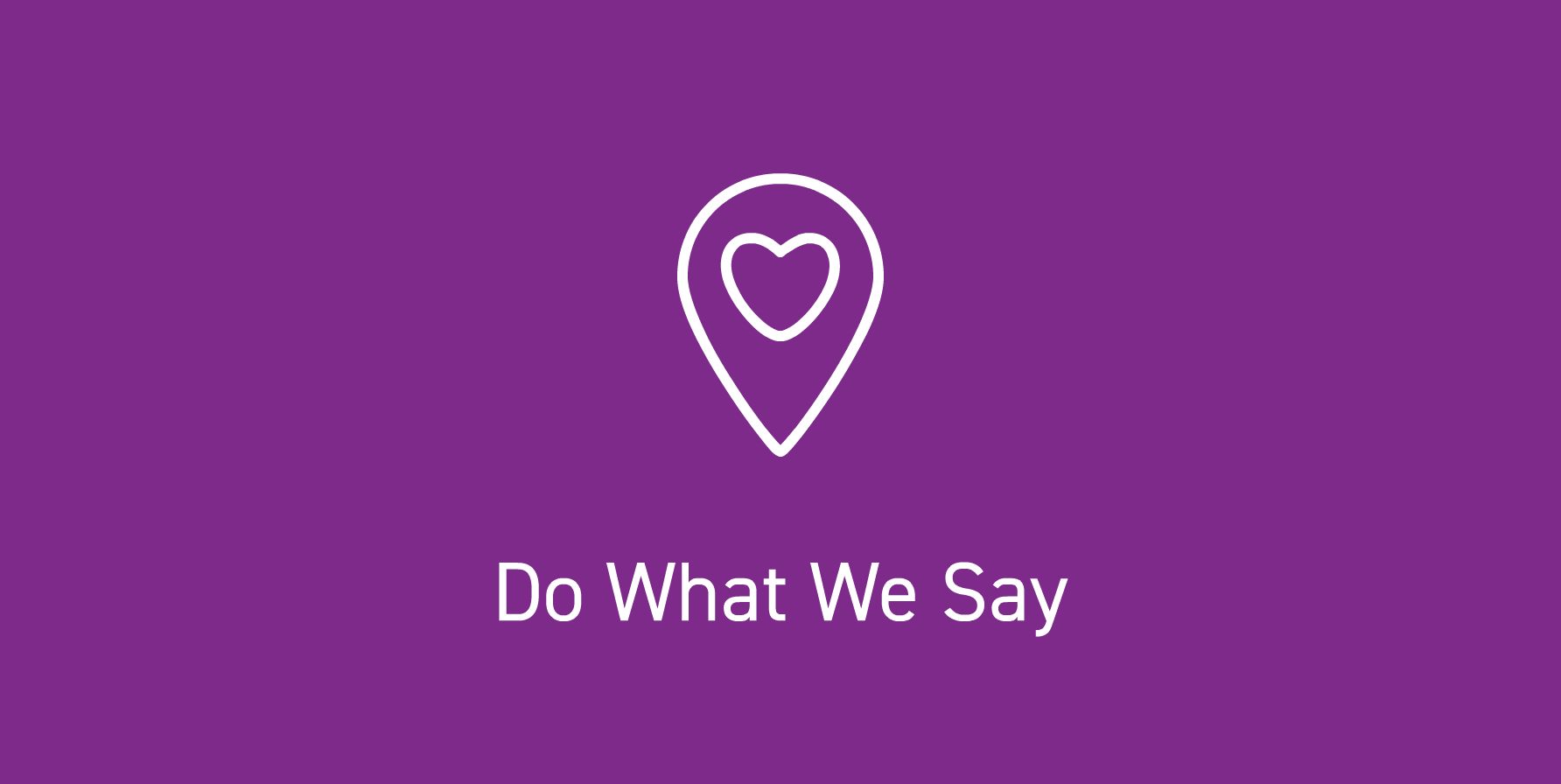At BillGO, we’re serious backers of management-guru Peter Drucker’s philosophy that company “culture eats strategy for breakfast.”
Not just because organizations with strong cultures have been shown to experience a 4x increase in revenue growth, end up boosting productivity by 12 percent, and receive 20 percent higher ratings from their employees. While those stats are head-turners and important reasons to adopt a dynamic company culture, there’s more to it than that.
“If you dig in a little bit deeper, here’s the deal,” says BillGO Cofounder and CEO Dan Holt. “You can come up with the best strategy and get the smartest people together in a room. And maybe that team will initially win because of that strategy. But the thing is, strategies change over time. So if that organization doesn’t have an amazing culture and team members that work well together, it won't succeed in the long run.
Dig deeper yet, and you’ll find that behind every successful company culture is a foundation of solid core values. The equivalent of cultural guideposts, core values are intrinsically embedded tenets that define how team members work together. Look at it this way: If culture is eating strategy for breakfast, it’s dining on that sucker at table set with core values.
Hungry for more? Read on for insights into BillGO’s value set, including what they are, why we crafted them via a collaborative team process, and how we put them to work every day.
Collaboratively building core values: A tough task worth the work
Let’s get real: Amassing a meaningful set of organizational core values — something more than just words on a wall — is no easy task. In fact, a recent study by Fond showed that while 90 percent of companies report documenting a clear set of core values, only one out of every 10 HR leaders believes that 80 percent or more of their employees can recite them.
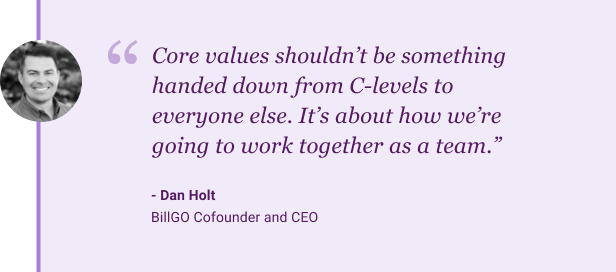
“It took us six months to come up with our core values,” Holt says. “We went through literally hundreds and hundreds of different suggestions as we asked ourselves, ‘Who are we? Why do we exist? What tenets are we going to live by?’”
Holt has the following advice for other companies looking to select core values that will stick:
- Get everyone involved: “I don’t care whether you have a two-person company or 10,000 people, you want everyone involved in the process,” Holt says. Online surveys, town hall meetings, and individual team workshops are all great ways to do this. “At the end of the day,” Holt explains, “when everybody has a say, you’ll get more buy-in to the process — even if it takes longer.”
- Set values that are authentic and easy to understand: A winning set of core values aren’t built from pie-in-the sky euphemisms; they have to be relatable to the challenges and goals team members face on a daily basis. To achieve this, ask the hard questions during your research period. “Maybe the team won't know the answers at first,” Holt says. “But when you work through it, you’ll get to the heart of who the company is.”
- Talk about your values ... a lot: If you really want your organizational tenets to become ingrained in the company culture, they have to be more than just a page on your website. “You have to talk about them again, and again, and again,“ Holt says. “And just about the time you are sick and tired of talking about them is when it’s starting to work.” Don’t forget to tie back company wins to each of your values.
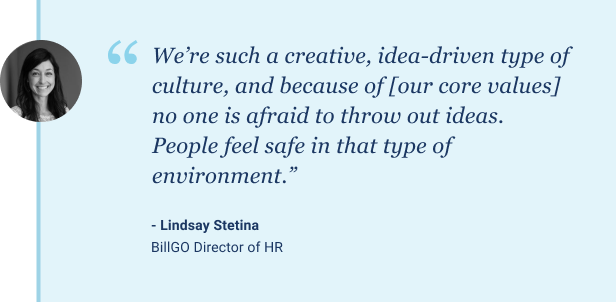
- Know nothing’s set in stone: As companies scale — both in terms of strategy and team size — it’s important to perform regular reviews of your core values to see if they need updating. “If you look at some of the greatest fintech companies out there, they’re not who they said they were going to be the day they started,” Holt says. “For the most part, the BillGO culture has stood the test of time. But there have been tweaks, and I wouldn’t be shocked if we made changes again in the next couple of years.”
- Never create values that feel “top-down”: “I don’t want to run a dictatorship; that’s not interesting to me at all,” Holt says. “Core values shouldn’t be something handed down from C-levels to everyone else. It’s about how we’re going to work together as a team. That’s why we begin our core values with ‘Together we:’”
BillGO’s core values: Designed to inspire high-performing teams
BillGO’s core values were created to drive a culture that motivates some of the best and brightest talent in the industry. “We want people thinking about how we can perform to win and be our absolute best together,” Holt says. “Every one of us are leaders.” Here's our core value set:
Together we:
- Do what we say
- Focus on impact
- Innovate past what exists
- Seek to understand
- Make it fun!
Now let’s flesh that out by explaining exactly what each of these principles means, and how we apply them every day:
Do what we say: This one seems simple at first: If you commit to something, follow through and deliver on what you’ve promised. “There’s a level of commitment that I see from every employee in this organization — if they say they’re going to do something, they get it done,” says Lindsay Stetina, BillGO’s Director of HR.
But at the same time, says Holt, there’s a balance. “It’s okay to fail,” he says. “We’re not looking for people who are underpromising and overdelivering. We want people to go for the gold but know that it’s okay to get the silver. As long as you went for the gold and believed in it first.”
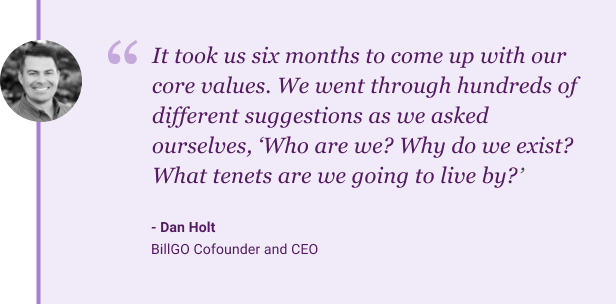
Focus on impact: Here’s a value that's all about measuring, a reminder to work on the items that will drive the greatest results first. “Everybody should be getting up every day and saying, ‘How am I going to make the biggest impact at BillGO today?’” Holt says. “Because there’s too much to do and not enough time.”
Adds Stetina: “There are so many different initiatives across the organization that if you don’t focus on the ones that have the biggest bang for your buck at BillGO, you’ll need to take a step back and reassess.”
Innovate past what exists: Team members are encouraged to challenge themselves and others to push boundaries, solve complex problems, and share accomplishments. “One of the biggest things I see in this industry is that someone gets excited by what another company is doing and wants to copy it,” Holt says. “Big picture-wise, we don’t want to do what everybody’s done before. We want to do something totally different.
But innovation doesn’t always have to be on a grand scale, Holt explains. Sometimes it’s as simple as developing a simple innovation to automate what was once a manual task, in the process boosting productivity. These too are wins to be celebrated and shared.
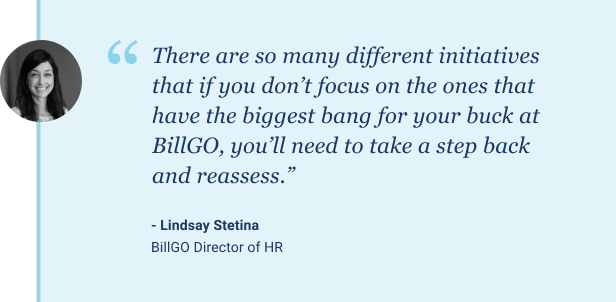
Seek to understand: BillGOans are reminded to be transparent, allow ideas their spotlight, and remain receptive to others’ point of view. “We really need to understand where other people are coming from — our teammates, our clients, our partners, and the industry — before we pass judgement,” Holt says. “We all have lizard brains, and can make very rapid decisions that are critical. I always encourage people to challenge themselves and be a plus before a minus. Because if we all go around the room and put down an idea that someone brought to the table, that person is going to be destroyed, and everyone else is going to be afraid. Don’t worry, we’ll always critique at the end, but we need to help each other first.”
In Stetina’s opinion, it’s this value that allows all the others to flourish. “We’re such a creative, idea-driven type of culture, and because of this mentality no one is afraid to throw out ideas,” she says. “People feel safe in that type of environment. It gets all these creative juices flowing, and that causes us to innovate past what exists, focus on impact, do what we say, and make it fun.”
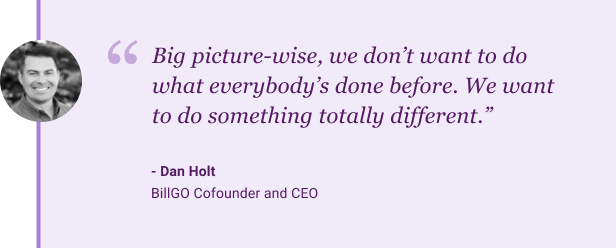
Make it fun: Whether it’s an impromptu BBQ on the deck, celebrating birthdays with a ukulele serenade, or an event at Top Golf, at BillGO we find the fun in the everyday, which helps us to foster positivity and collaboration. “At the end of the day, we’re all human, and relationships matter,” Holt says. “We spend a lot of time with each other and need to celebrate our wins. Plus, if you build those relationships and make it fun, when things get hard it’s a lot easier to get through it. It just puts a band around the culture.”
Personalizing the fun is an important goal for Stetina, who sends each new hire a survey about their favorite activities and how they liked to be recognized. “Everyone sees fun in a different way,” she says.
Are you building successful core values at your organization? Get in on the conversation by commenting on our Facebook, LinkedIn, and Twitter feeds.

